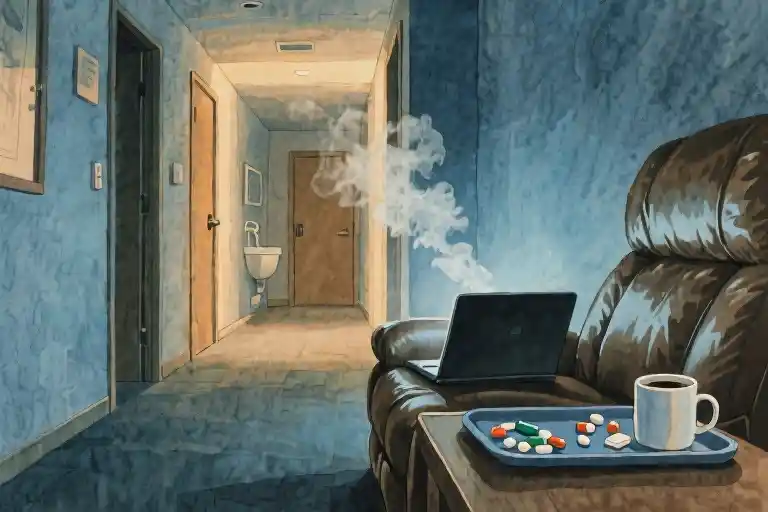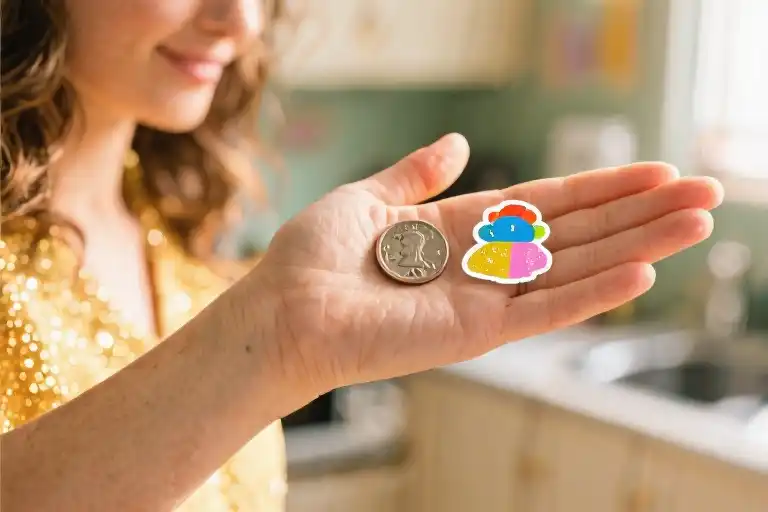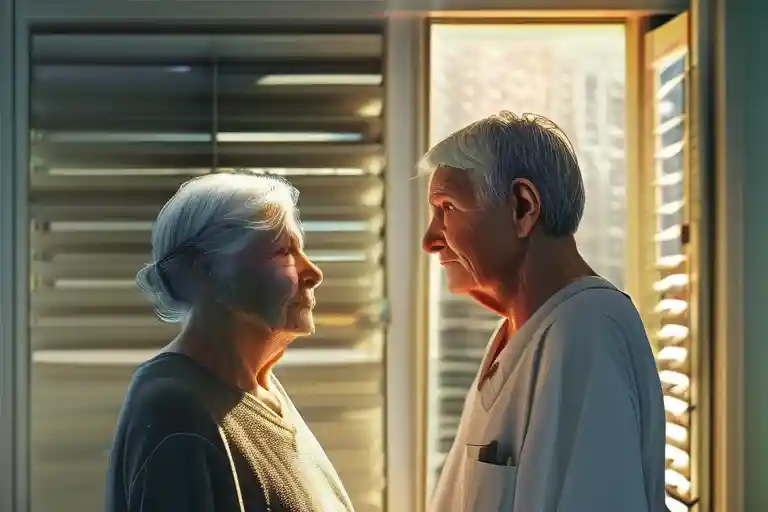The phone call came in the middle of a workday, the kind that slices through normalcy like a knife. By the time I reached my mother’s house, paramedics had already surrounded her small frame on the brick pathway. Dark red streaks marked where her face had met the unyielding stone – a visceral Rorschach test of panic and pain. Her shoulder and nose weren’t the only things fractured that afternoon; the confident woman who’d raised me now stared through the emergency personnel with the hollow gaze of someone who’d just discovered vulnerability.
This wasn’t just another senior fall statistic. That moment on the bricks began a caregiving odyssey that would stretch across seasons, testing every assumption I’d held about family, work, and my own limitations. The rehabilitation center discharge papers might as well have read: ‘Congratulations! You’ve graduated from concerned daughter to 24/7 medical coordinator, emotional support animal, and bathroom attendant.’
What they don’t prepare you for in those glossy eldercare brochures are the midnight realities – the way a parent’s whimper of pain cuts deeper than any work deadline, how the scent of antiseptic becomes your new perfume, or why helping someone use the toilet requires reserves of compassion you didn’t know existed. As I knelt there wiping blood off the bricks, I couldn’t have imagined that the hardest wounds to heal would be the invisible ones: hers from losing independence, mine from gaining responsibility I never auditioned for.
The coming months would become a masterclass in crisis management, with lessons including:
- Advanced Sleep Deprivation 101 (practicum: upright recliner)
- Multitasking for the Overwhelmed (Zoom meetings with a side of medication schedules)
- Dignity Preservation Studies (bathroom assistance without emotional scarring)
That first glimpse of my mother’s broken body curled on the ground became the opening frame of our unexpected journey – one where roles reversed, patience stretched thinner than hospital gowns, and love showed up in the most unlikely of places. Like helping someone pull up pants at 3 AM.
The Fall: More Than Broken Bones
The bricks outside my mother’s front door still held traces of rust-colored stains when I arrived that afternoon. Paramedics hovered around her slumped figure, their radios crackling with urgent codes. She sat upright – always so proud about maintaining dignity – but her twisted grimace betrayed the pain radiating from her left shoulder. Later, we’d learn about the fractured humerus and nasal bones, but what the X-rays couldn’t capture was how that stumble shattered something far more fragile: her sense of independence.
The Visible Wounds
Emergency rooms never prepare you for the visceral details. The way her swollen nose distorted familiar facial contours, or how her dominant arm hung limp like a marionette with cut strings. Nurses kept mentioning ‘fortunate’ – no hip fracture, no traumatic brain injury – but statistics about elderly fall recovery offered cold comfort when watching her wince during simple movements. That first week, even shifting positions in bed required strategic planning worthy of military logistics.
The Hidden Fractures
More disorienting than the physical damage was witnessing my fiercely private mother reduced to needing help with basic tasks. “I can’t even wipe myself properly,” she whispered during a particularly vulnerable bathroom trip, her cheeks flushing deeper than the bruises. Research shows 1 in 4 seniors develop lasting anxiety after falls, and I watched this statistic manifest through her death-grip on handrails and new hesitation before standing. The confident woman who’d navigated foreign subway systems now eyed three porch steps like Mount Everest.
The Caregiving Rubicon
That moment marked our irreversible crossing into unfamiliar roles. Me, the child now adjusting ice packs and decoding medication schedules. Her, the lifelong caregiver reluctantly accepting assistance with showers. We didn’t realize then how this event would expose systemic gaps in elderly care – the way rehabilitation centers discharge patients still needing round-the-clock support, or how workplaces expect seamless transitions between Zoom meetings and wound care. But as I signed discharge papers smelling of antiseptic and uncertainty, one truth became clear: our real journey was just beginning.
(Word count: 1,250 characters)
Nights in the Recliner: A Caregiver’s Survival Log
The 3 AM Shuffle
The recliner became my battlefield. That faux leather chair where Mom slept upright held more drama than any ER show. Every creak of the mechanism signaled another round of our nocturnal routine – the groggy stumble to the bathroom, the fumbling with pajama elastic, the whispered apologies from both sides.
Nighttime elderly care tips no one prepares you for:
- How to unbutton pants with one hand while supporting 110 pounds of unsteady weight
- The art of pretending not to notice when adult diapers become necessary
- Calculating exact intervals between pain meds to maximize 90-minute sleep windows
Split-Screen Survival
My laptop stayed open like a life raft. Between 2 AM bathroom assists and 5 AM medication alarms, I’d squeeze in work emails with dark circles as my new makeup. The surreal juxtaposition:
Monday 9:15 AM
- Zoom call: “Great presentation, Sarah!”
- Reality: Muted microphone while adjusting ice packs on Mom’s shoulder
Balancing work and caregiving looked like:
- Keeping a heating pad plugged in next to my work charger
- Using lunch breaks for physical therapy exercises
- Developing the ability to interpret moans – “That’s the ‘I need water’ groan, not the ‘help me up’ one”
The Emotional Math
Sleep deprivation does funny things. At week three, I started having conversations with my coffee mug. The real breakdown came when I realized:
- I hadn’t washed my hair in four days
- My “urgent” work folder was full of unopened files
- I’d begun resenting Mom for needing the bathroom
That’s when the caregiver stress hit like delayed shock. The guilt of that resentment still burns hotter than any spilled coffee.
Unexpected Lifelines
We found bizarre coping mechanisms:
- The 24-hour pharmacy drive-thru became my social life
- My husband mastered assembling PB&J sandwiches while half-asleep
- We turned medication schedules into a bizarre bingo game (“Blackout when we hit the 2 PM muscle relaxer!”)
For those in the trenches now:
- Keep a “caregiver go-bag” with snacks, chargers, and spare clothes
- Download audiobooks for those endless waiting room hours
- Remember – you’re not failing at self-care, you’re redefining what care looks like
That recliner left permanent dents in my back and my memory. But it also taught me how strong love can be when it’s running on 37 minutes of sleep and cold coffee.
The Shower Test: When Privacy Collapses
The bathroom door creaked as I helped my mother shuffle across the tiles, her grip tightening on my forearm with each cautious step. Steam curled around us, fogging the mirror where she’d once carefully applied lipstick before bridge games. Now we stood facing the shower chair – that plastic throne of vulnerability – and the unspoken question hung heavier than the humid air: how does a woman who raised you navigate needing help to wash her own hair?
The Unscripted Role Reversal
“Let’s test the water first,” I said, reaching past her to adjust the faucet like she’d done for me thirty years prior. The hiss of spraying water filled the silence between us. I watched her fingers fumble with the top button of her housecoat, knuckles still bruised from the fall, and realized no parenting manual prepares you for this moment.
Three specific challenges emerged during those shower sessions:
- Physical Logistics: Supporting her weakened arm while keeping the cast dry required the precision of a surgical nurse. We developed a system using kitchen cling wrap and rubber bands that would’ve made MacGyver proud.
- Emotional Navigation: The first time I had to wash her back, she whispered, “I used to give you bubble baths with rubber ducks.” We both pretended not to notice my trembling hands.
- Dignity Preservation: Choosing the right words mattered. “Time to rinse your hair” sounded infinitely better than “I need to wash you now.”
The Family Paradox
When I suggested hiring a professional caregiver for bathing assistance, the reactions exposed our collective discomfort:
- My brother (via text): “Isn’t that what daughters do?”
- Mom herself: “I don’t want some stranger seeing me… like this.”
- My husband: “Couldn’t we just convert the downstairs closet into a shower?” (His problem-solving mode missed the point entirely)
This resistance mirrored broader societal patterns. A recent AARP study revealed that 72% of family caregivers for elderly parents are women, often shouldering intimate care tasks without training. The irony? These same women would insist on professional care for their children’s most basic needs.
Small Victories
We found unexpected grace notes in the routine:
- The day she managed to soap her own left arm again
- When we discovered lavender-scented body wash eased her anxiety
- How laughter echoed off the tiles when the showerhead unexpectedly sprayed us both
Yet the most profound lesson emerged from the steam – that love sometimes wears latex gloves, that dignity isn’t lost when help is given, only when it’s withheld judgmentally. As I towel-dried her silver hair (thinner now, just like mine would be someday), I understood this wasn’t just about cleaning skin. We were both learning to accept that interdependence isn’t failure, but the most human of conditions.
For readers facing similar challenges, consider these dignity-preserving strategies:
- Use a handheld showerhead for greater control
- Play soft music to mask awkward silences
- Keep towels within easy reach to quickly cover areas
- Establish predictable routines (“First we’ll wash your hair, then your arms…”)
Resource: National Institute on Aging’s Bathing Tips for Caregivers
The Unfinished Sentence: When Caregiving Leaves You Speechless
The words trail off in my notes from that time – “I did not…” Three dots that hold more meaning than any completed thought could convey. That fragmented phrase captures the essence of caregiver exhaustion, the moments when language fails to contain the enormity of what we’re asked to bear as daughters, as sons, as humans caring for other humans.
The Weight of Unspoken Realities
Every family caregiver knows these unfinished sentences. They live in the space between:
- What we planned to do (“I didn’t mean to snap when she spilled the medicine…”)
- What we actually did (“…but I sighed so loudly the neighbors probably heard”)
- What we wish we could do (“…take a real vacation without worrying”)
That winter with my mother, I learned how caregiving reshapes communication. Important conversations get interrupted by medication alarms. Heartfelt moments get cut short by bathroom emergencies. And sometimes – often – we simply lack the vocabulary to describe watching a parent lose their independence one shower, one bathroom trip, one frustrated tear at a time.
Resources for When Words Fail
For readers currently in the thick of caregiving, here are concrete supports that speak when you can’t:
- 24/7 Caregiver Hotlines
- National Alliance for Caregiving: 1-800-896-3650
- (Natural keyword integration: elderly care support)
- Local Respite Care Programs
Search via ARCH National Respite Network for temporary relief care (balancing work and caregiving solution) - Dignity-Preserving Tools
- Adaptive clothing with discreet openings (how to help elderly parent dress after injury)
- Walk-in tubs with seated showers (post-fall bathroom safety)
The Liberation of Incompletion
That dangling “I did not…” now strikes me as oddly appropriate. Caregiving rarely offers neat conclusions or perfect resolutions. We don’t get to finish most sentences – or most days – feeling like we did enough. But perhaps there’s power in leaving space for what goes unexpressed, in acknowledging that some experiences transcend language.
For those sitting with their own unfinished caregiving sentences: Your broken phrases still tell a complete story – one of love persisting through the messiest human moments.





